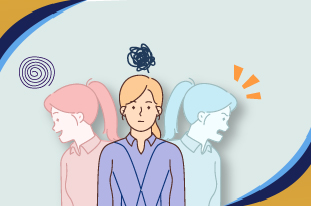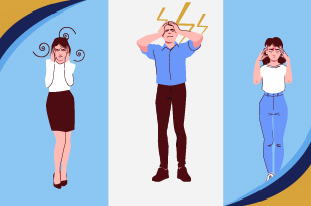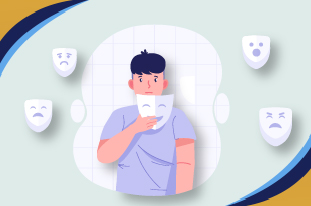There are a lot of overlapping symptoms in the two most common mental disorders that affect people: Bipolar and ADHD. The overlapping of symptoms of these two disorders often makes diagnosis difficult to ascertain. So, what to do when it comes to the problem of ADHD vs bipolar disorder? We will be able to find in the words below in addition to the basics of both of these disorders and their treatment.
ADHD
Attention-deficit/hyperactivity disorder, or ADHD as it is abbreviated, is a mental condition that affects the executive functioning of the affected individual. It does this by inducing symptoms like hyperactivity, restlessness, inability to focus on a single object of interest, procrastination, and even sudden freeze. Most of the time, it begins manifesting with its symptoms in early childhood but goes well into adulthood if it is left untreated.
Read More: Bipolar Disorder Vs ADHD: Learn The Symptoms
Bipolar Disorder
Bipolar on the other hand is a mood disorder, which is characterized by two contrasting moods that alternate between each other usually with intervals in between (depending on the type of bipolar disorder you are suffering from). The two contrasting disorders are extreme in every sense and the back and forth between is what makes this disorder harder to deal with, especially if the affected individual is suffering from it for a long time. These two contrasting moods are manic and depressive. Manic episodes are all about profound happiness and excitement and depressive ones tend to be extremely sad and suicidal. These are the most common types:
Bipolar 1
Has manic episodes that last for at least a week, often requiring hospitalization. Affected individuals may or may not experience depressive episodes for two weeks or more.
Bipolar 2
People with bipolar II tend to experience a major depressive episode before or after a hypomanic episode, which is a less intense form of manic episode.
Cyclothymic disorder
Alternating hypomanic and depressive symptoms that last for at least two years in adults and one year in children and teenagers, where the depressive ones are less intense than the ones in bipolar 1 or clinical depression.
ADHD vs Bipolar Symptoms
Here is the kicker for ADHD vs bipolar symptoms. While there are similarities, there are also differences. How is that possible, let’s find out.

Similarities Between ADHD And Bipolar
There is no clear way to distinguish or match these two. The way that could be done is following the criteria defined in the Diagnostic and Statistical Manual of Mental Disorders (DSM) from the American Psychiatric Association. In reference to that, a lot of similarities between ADHD and bipolar do exist. Let’s find out what:
Hyperactivity
The hypomania of bipolar and the hyperactivity of ADHD are so similar that sometimes it is difficult for mental health professionals to differentiate and find out what the actual diagnosis is. You are unable to do one posture, fidget constantly, and move around and move your body a little bit too excessively. You will feel like a machinery whose motor is always running and never ever shuts down in both of these similar symptoms of ADHD and bipolar disorder. This type of symptom is more commonly found in children.
Read More: What’s The Difference Between A Mood Disorder And A Personality Disorder?
Mood Swings
Mood dysregulation is a common and often the most identifiable symptom of both ADHD and bipolar, making the debate of ADHD vs bipolar disorder slightly more simple. People under the spell of hypomania are highly irritable and quick to jump to the threat of violence. Patients of both ADHD and bipolar disorder often report symptoms like low frustration tolerance, irritability, and rapid changes in mood, which are commonly associated with mood swings.
Distraction and Inattention
Distractibility is a core component and highly central to the debate of ADHD vs bipolar disorder and properly answers the question of “Is ADHD the same as bipolar?” While actively present in ADHD, it’s more covert in bipolar disorder. That is more often than not found in the burial depths of the depressive episode, the one half that characterizes bipolar disorder, or a mixture of different episodes but it is there somewhere. The symptoms related to the back and forth of depression and sudden excitability can make it difficult to focus on one thing and have lots of distractions.
So What Is The Difference Between Bipolar And ADHD?
A normal explanation of the differences found in the comparison of ADHD vs bipolar disorder will not be sufficient. The comparison in the table below can do a better job:
| Differences | ADHD | Bipolar disorder |
| Persistence | ADHD is a persistent, chronic, pervasive condition. | The mood fluctuations in bipolar tend to be episodic. |
| Onset | ADHD develops when you’re young. | In contrast, the average age of bipolar disorder onset is 25. So, onset usually mid-20s |
| Type | ADHD is a neurodevelopmental disorder | Bipolar is a mood disorder |
| The Way Depression Manifests | Depression and anxiety are also common in both disorders, but they’re secondary in ADHD | Depressive states are a core component of bipolar disorder |
Why is it challenging to determine whether someone has ADHD and bipolar disorder?
Due to the many similar symptoms that each disorder can manifest, mental health professionals may find it difficult to come to a conclusion even if they are consulting standard operating procedures. This can especially be difficult, if it’s not ADHD vs Bipolar anymore but rather is a comorbidity. Research suggests a comorbidity as high as 20 percent for ADHD and bipolar disorder (all types). Treatment always requires a careful assessment and often a delicate balance of medication, especially when it comes to the comorbidity of ADHD and bipolar 1.
Read More: How to Help Someone With Bipolar Disorder?
The path to both diagnoses can be a long and windy road hampered by many obstacles. Careful evaluation and timely consultation with a proper mental health professional who knows their stuff can only ensure misdiagnosis does not happen. This is why it is time to talk about treating these two, whether separately or together.
Treatment
As mentioned before, they are often clinically hard to distinguish from each other precisely due to the overlapping of their symptoms. Treating this combo requires careful evaluation, suitable therapy, and medication management that fits both of the conditions, whether it’s comorbidity or not. Before we get into how these can be treated at the same time, we should ensure that you see how treatment stacks in terms of ADHD vs bipolar disorder.
Psychotherapy
ADHD
Psychotherapies (talk therapy) like Exposure Response Prevention, where patients are motivated to experience the same triggers that induce symptoms of ADHD, can really help, as this way, the triggers will lose their power. When it comes to the question of, “Is ADHD the same as bipolar?” Well, in terms of this treatment method, they are not the same. This is because bipolar needs something else that is suitable for it.
Bipolar
For bipolar, either Interpersonal and Social Rhythm Therapy (ISRT) or Dialectical Behavior Therapy (DBT) are extremely suitable.
ISRT
In the ISRT, a mental health professional coaches the affected individuals on how to regulate their daily routines, once those individuals themselves have documented rigorously.
DBT
DBT is a skill-based approach that includes both individual and group therapy that teaches mindfulness and acceptance skills to the patient making it suitable for helping patients suffering from bipolar.
A combination of these or mixing them up a little can really help find resolutions for the comorbidity of both ADHD and bipolar disorder. All of the different types of therapies mentioned above are considered to be part of cognitive behavioral therapies, a class of therapy that helps change negative thought patterns and manage emotional dysregulation.
Read More: Can ADHD Cause Gender Dysphoria? An In-depth Study
Medication
Something like bipolar 2 is typically treated with a combination of mood stabilizers and antipsychotics. Antidepressants like Selective Serotonin Reuptake Inhibitors, which directly try to increase the neurotransmitter serotonin (which is usually low in depressive minds) can be used to treat depressive episodes but as a side effect, it will increase the hypomania symptoms and thus should be avoided unless it is absolutely necessary to take them (as recommended by a professional).
It’s a win or lose when it comes to the stimulants that are usually prescribed for ADHD but will act up if you are suffering from Bipolar too. That only time and the mental health professional who is prescribing you the medicine and is responsible for monitoring the progression of your treatment will only be able to tell.
Conclusion
Now that the debate of ADHD vs bipolar disorder is over and you have an idea that they have similarities (which often makes it difficult to diagnose them) and even some differences, perhaps you should start looking for treatment that was also talked about afterward. For that, you can consult with Orange Coast Psychiatry today!
























